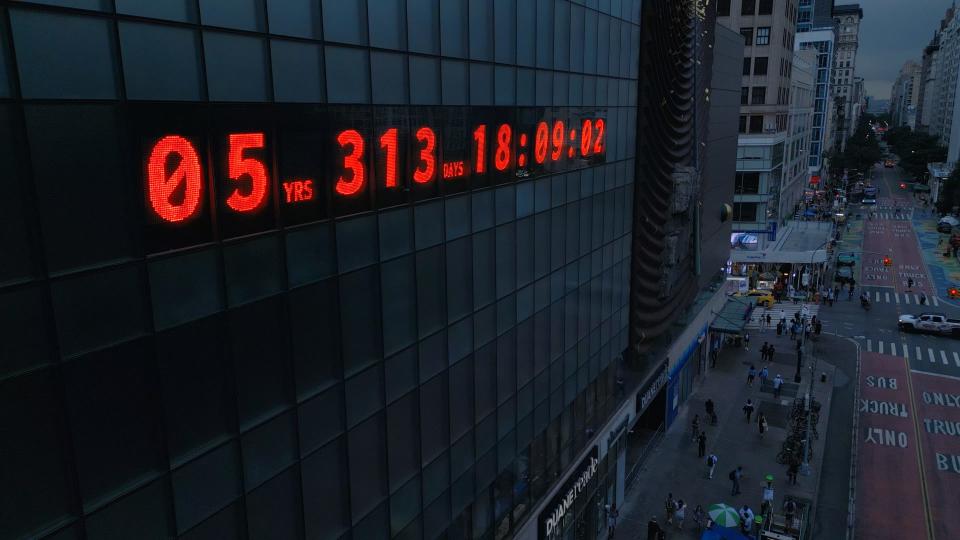'Young people are freaked out': Weekend climate change protests planned around US, globe
- Oops!Something went wrong.Please try again later.
After a summer of record-smashing global warming events, advocates hope this weekend will bring some of the largest climate protests in years nationwide, including marches, school walk-outs and a major mobilization effort in New York City on Sunday.
"This summer has been unprecedented," said Xiye Bastida, a 21-year-old climate activist from Philadelphia. "Not only the heat waves, we've had the hottest days in 125,000 years, hurricanes where they aren't supposed to be. The skies turned red in New York due to the smoke. We can't keep up with all the things we've seen."
She will be one of what advocates hope will be hundreds of thousands of people participating worldwide in what's being called global days of action between Friday and Sunday. More than 200 protests are scheduled globally.
In Berlin, Germany as many as 24,000 protesters marched through the city on Friday, calling for stronger efforts to curb climate change.

What do climate change protest organizers want?
Multiple groups are sponsoring and organizing but the main US focus is a call for the Biden Administration to reject new fossil fuel projects, phase out fossil fuels and declare a climate emergency.
Organizers predict the U.S. marches will be the largest climate protests in the last five years.
"People don't want to march against something, they want to march for something," said Bastida, who is Mexican-American and a member of the indigenous Otomi community. "These marches have a very specific all to action."
Last week the United Nations warned that the world is "heading in the wrong direction" when it comes to climate change.
Globally, the protests are focusing on calls for political leaders to rapidly phase out fossil fuels.
“Floods, droughts, heat waves, extreme storms and wildfires are going from bad to worse, breaking records with alarming frequency," said U.N. Secretary-General António Guterres, in a statement. "There is nothing natural about the new scale of these disasters. They are the price of humanity’s fossil fuel addiction."
The activism is also linked to the United Nations General Assembly session scheduled for Sept. 20 on global participation and collaboration on climate action along with the fifteenth annual Climate Week New York City.
Organizers from multiple activist groups are calling for a new urgency after a summer that so alarmed Guterres that he said in July, “The era of global warming has ended. The era of global boiling has arrived.”
“Young people are freaked out by climate change,” said Aru Shiney-Ajay, deputy campaigns director for the Sunrise Movement, whose website proclaims "We are the Climate Revolution."
Increasingly drastic, but non-violent, action
As more people are impacted by climate change, Noah Gordon, co-director of the climate program at the Carnegie Endowment for International Peace in Washington DC., expects an increase in large public demonstrations. But there is also an uptick in small efforts aimed at getting the public to take notice.
"If you think it's the end of the world, it makes sense to act. You're starting to see more drastic action, people gluing themselves to a highway or at car dealerships," he said.
In Europe, climate protesters have defaced art, while during the US Open semifinal match on Sept. 7, protesters wearing T-shirts that said "End Fossil Fuels" interrupted the match for 49 minutes and one glued his feet to the cement floor.
Gordon noted that while such protests inconvenienced some people, they have stayed overwhelmingly non-violent.
A growing movement
Climate protests have been taking place for years but became more urgent with the emergence of Climate Strikes, a movement begun in September 2018 when Swedish high schooler Greta Thunberg skipped school for three weeks, running to stand outside the Swedish parliament and calling for lawmakers to address climate change.
In 2019 the organization she helped found, Fridays for the Future, held a massive Global Climate Strike. In New York City, as many as 250,000 marched. Large groups also turned out in San Francisco (40,000), Denver (7,500) Boston (7,000), Chicago (3,000), Portland (2,000) and Washington, D.C., among other cities.
The COVID pandemic somewhat slowed the movement's momentum, making the 2023 protests the first major show of activity in many cities.
"It's a very big deal," said Gordon. He maintains a climate protest tracker and expects this to be a major weekend for climate protests after the pandemic lull.
Despite years of concern about global warming, the reality is staring humanity in the face, he said. The warning signs have spanned generations and decades, but now those abstract, expert predictions are increasingly becoming a world-shaping reality.
"I would expect there to be large protests, especially with the summer we just had," he said.
This article originally appeared on USA TODAY: Global days of action Climate change protests planned this weekend

